Bellwether Brings Electric, Low-carbon Roasting to Japan in First International Expansion
Japanese consumers opened a recent edition of Nikkei ‑ the world’s largest financial newspaper, to headlines introducing Bellwether’s all‑electric, ventless roaster for the first time to the coffee‑obsessed country known for its thriving cafe culture.
Here at Bellwether, we believe that the sustainable micro‑roaster is the 4th wave of coffee, and journalists at Nikkei agree. In their piece titled “Coming, the Fourth Wave of Coffee: Pioneer of Home Appliance‑style ‘E‑Roasting Machines’ Comes to Japan” (translated).
In it, Nikkei posits “The secret to Bellwether’s popularity is that they are electric and emit no smoke, making it easy for even small cafes to produce their own beans. The number of Bellwether Roasters in the U.S. has increased to several hundred, driven by environmental regulations, and will enter the Japanese market in July 2023. Will the combination of individuality and the environment be the "fourth wave" of coffee, with 2 billion cups of coffee consumed daily around the world?”
The article addresses the many challenges faced by independent retailers who wish to roast but experience significant barriers ‑ “Few independent cafes, especially in urban areas, can afford gas‑powered roasters due to the cost of securing a space and the administrative challenges of hiring a roaster. It is common for cafes to purchase roasted coffee beans from outside suppliers. However, there were limits to what could be achieved if the roasting of the beans, which greatly affects the taste, was left to outside suppliers.”
To investigate how Bellwether is increasing accessibility for retailers hoping to capture the benefits of roasting in‑house but lack the space or labor to do so, the article profiles Bellwether customer Wilson Jones, owner of San Francisco’s Coffee Shop. Wilson describes how his Bellwether helps his very small shop with only a counter and a few seats compete against major‑player competitors, telling Nikkei “Thanks to this machine, we can now compete head‑to‑head with big companies like Nestle and Starbucks."
Wilson goes on to say that the ability to roast his own beans "has allowed me to show my commitment and reduce the cost of sourcing beans.” Describing how roasting his own coffee allowed him to expand his revenue streams during Covid which kept him in business when many other cafes were forced to close.
Wilson tells Nikkei that he’s now making enough profit to keep his business afloat and "we have a good prospect of opening a new store."
Bellwether founder and CEO Ricardo Lopez explains that cafes like Coffee Shop were exactly who the Bellwether was built for.
"Cafes and retailers need to be able to participate in the procurement and roasting of their coffee.” To this end, he set out to develop a roasting machine that could be placed in stores and used easily.
Out of this process came the Bellwether Roaster ‑ made all‑electric to be fossil fuel independent and easy to install, fully automated so anyone could roast regardless of their experience, and fully integrated with a green coffee marketplace for retailers to source the highest quality coffees from around the world, shipped right to their cafe.
Now Bellwether supports hundreds of coffee retailers, including those who serve coffee in addition to their core product but not as the focus of the business. “One example is Craftsman and Wolves, a famous pastry store in San Francisco. Coffee plays a supporting role at the store, but the majority of customers who eat pastries at the store buy them together. One of the co‑owners, Lawrence Lai, says, "We can now control the quality of the coffee that complements the pastries.”"
Nikkei also describes how changing attitudes about fossil fuels have helped Bellwether find a foothold in sustainability‑minded businesses. “A growing number of U.S. cities are moving to ban gas appliances in new buildings because of their environmental impact. According to Bellwether's Lopez, 31 million people in the U.S. alone live in areas subject to gas restrictions, and with the announcement in May by Eastern New York State that new buildings will be "all‑electric" beginning in 2014, it is becoming increasingly difficult to install conventional gas‑powered roasters. It is becoming easier to turn to electric roasters.”
The state of California recently invested in the switch to electric from fossil fuels by distributing large amounts of grant funding to businesses who switched to electric technology from existing gas infrastructure. Legacy roasters Red Bay Coffee Roasters and Heirloom Coffee took advantage of the program, each purchasing multiple roasters for their Bay Area operations, removing the equivalent of 2 million pounds of carbon from the atmosphere each year.
Bringing the future of coffee to a global audience
Nikkei notes now that “As the business begins to take off, the company is eyeing Japan as a new market. ‘Japan has had a lot of influence on the U.S. coffee culture and has a culture of combining craft and technology,’ Lopez says.”
“In the fall of 2020, he visited Kiyosumi‑Shirakawa in Tokyo, the "holy land" of coffee in Japan, and hired personnel with ties to Japan at the head office. First, in July 2022, the company will begin sales in the Japanese market through distributors. As in the U.S., the company also plans to develop a mail order site for green coffee beans for companies that have introduced the product.”
With the growing appetite for sustainable alternatives to traditional roasting, combined with Japan’s excitement for bespoke coffee experiences Lopez tells Nikkei "we should be able to deliver 100 units in Japan by 2024.”
We can’t wait to help coffee businesses across the globe access the freshest, most sustainable coffee by roasting in‑house. As Nikkei predicts ‑ “The fourth wave of coffee that has begun in the U.S. may change the landscape of cafes in Japan as well.”
Learn more at: http://japan.bellwethercoffee.com



